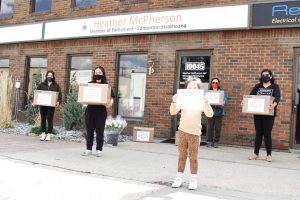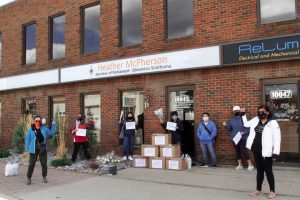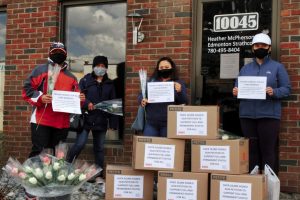Migrants advocates spend Mother’s Day campaigning for full status
Migrants advocates spend Mother’s Day campaigning for full status
This as temporary new pathways exclude thousands, they claim
 May 9, 2021
May 9, 2021
By Veronica Silva Cusi
The Philippine Reporter
Kababayans advocating for migrant rights joined peers in virtual and in-person activities on May 9, Mother’s Day, to call on the Liberals to ensure basic human rights through status for all.
The activities are the latest in years’ long activities organized by allies of the Migrant Rights Network (MRN), which include some Pinoy groups advocating for protection for migrants, including undocumented, temporary, and seasonal workers.
The activities are focused on a campaign for caregivers addressed to Prime Minister Trudeau, Immigration Minister Marco Mendicino, and local Members of Parliament.
But while the focus of Mother’s Day activities is on caregivers, advocates continue to campaign for full permanent residency status for all migrant workers, particularly just when the Liberals introduced temporary policies to grant PR status to healthcare and essential workers, and international graduates who are currently already in the country.
Mother’s Day events are “symbolic for our care workers. A lot of them are mothers separated from their families and their children,” said Cynthia Palmaria, co-founder and treasurer of Migrante Alberta.
Palmaria said Migrante is working with Edmonton-based Association of Caregivers in Alberta-Migrante (ACA-Migrante) in the campaign.
 Representing caregivers and other migrant workers, Palmaria met up with Heather McPherson, NDP MP for Edmonton-Strathcona, to submit the migrants rights petition with signatures. The petition will “fortify the voices of our care workers as she brings it to Parliament,” she added.
Representing caregivers and other migrant workers, Palmaria met up with Heather McPherson, NDP MP for Edmonton-Strathcona, to submit the migrants rights petition with signatures. The petition will “fortify the voices of our care workers as she brings it to Parliament,” she added.
Landed status for all is the campaign to give permanent full status to temporary workers and international students the minute they step into Canada.
Some kababayans have already worked with McPherson, who was instrumental in bringing to Parliament’s attention human rights abuses allegedly perpetuated by Canadian mining companies in the Philippines.
“As Migrante Canada and Migrante Alberta being part of Migrante Canada, our call is to regularize these workers. Whether you’re a temporary worker, a caregiver, or you have become undocumented — because your work permit was not renewed or you couldn’t get an LMIA (Labour Market Impact Assessment required to get work permit) – our call is to regularize these workers so that they can have rights and privileges as other workers,” added Palmaria.
 In Vancouver, a small group presented petitions inside boxes to the office of Defence Minister Harjit Sajjan, the Vancouver South Liberal MP.
In Vancouver, a small group presented petitions inside boxes to the office of Defence Minister Harjit Sajjan, the Vancouver South Liberal MP.
Julie Diesta, steering committee member of Vancouver-based Committee for Domestic Workers and Caregivers Rights (CDWCR), was joined by Byron Cruz of Sanctuary Health Vancouver, who represented undocumented and agricultural workers. Chris Sorio, Migrante BC secretary-general and other members of CDWCR were also in attendance.
Cruz said Mother’s Day and Father’s Day — when migrant groups are also planning to do a similar campaign — are important for migrant workers who cannot be with their families.
Migrant workers with temporary work permits, especially seasonal agricultural workers, cannot bring their families into Canada.
Mother’s Day also falls on the second weekend after the federal government has announced the new pathways to permanent residency announced on April 14. Cruz said this is significant because migrant groups say many migrant and undocumented workers, and refugee claimants are being left out of the new temporary policies.
New temporary pathways
Vancouver rights advocates are also with other migrant workers who are trying to determine their eligibility to apply to any of the 90,000 application slots available in the new pathway to PR.
The new temporary pathways – open from May 6 to November 5, 2021 only or until application caps are met — are open to essential workers in healthcare and other essential sectors, and international students who graduated from Canadian institutions.
A day after applications opened, the cap of 40,000 applications for international graduates was already met.
MRN, the alliance of migrant groups that include Migrante, CDWCR and Sanctuary Health Vancouver, released on May 4 the results of their own survey that showed that 45.4 per cent of migrant workers and 34.5 per cent of international graduates
“In total, 1.18 million undocumented residents, refugees, students and migrants in Quebec are not allowed to apply,’ the Canada-wide group’s statement reads.
Diesta and Cruz said that passing the English language requirement is a challenge.
“Many workers speak English, and they have been working in Canada for many years,” said Cruz. “They speak English but are never given the opportunity to study in Canada. And here comes the government requirement of (Canada Language Benchmark) Level 4. It’s not easy.”
To be eligible, applicants must also be present in Canada and have one year of full-time work experience or equivalent in eligible occupations in the National Occupation Classification (NOC).
Diesta said securing required documents, such as police clearance and work history from previous employers, is also a challenge during this pandemic. This is particularly true for work history of migrants who worked outside of Canada.
Some offices all over the world are not yet 100 per cent operating in this pandemic.
Critic
Some kababayans wanting to apply to the new paths are finding an ally in the opposition.
Last May 8, Jenny Kwan, NDP critic for Immigration, Refugees, Citizenship and Housing, and MP for Vancouver East, met online with some kababayans to help them understand the new guidelines for the new pathways.
“The government has created and are utilizing temporary foreign workers program as a replacement program for integration,” said Kwan in response to a question from The Philippines Reporter on how to make pathways to PR more permanent for jobs that are apparently consistently in-demand. “I firmly believe that people should have landed status upon arrival.”
She noted the case of caregivers and seasonal agricultural workers.
“Year after year, decade after decade, caregivers have come in and provided essential services to Canadian families to support our economy. But still, it is a temporary program. … Likewise for agricultural workers. There are some workers who come to Canada on a seasonal basis – year after year for the last 20 years. And still, they don’t have a permanent pathway towards PR,” said the Hong Kong-born MP who migrated to Canada at the age of nine.
“The NDP definitely supports permanent pathways as landed status on arrival,” she added.
——————————-
 Veronica Silva Cusi is a multimedia journalist and researcher with more than two decades of experience. She was a business journalist for 12 years with Business World in the Philippines and a journalism lecturer for 14 years at University of the Philippines. She’s been covering ethnic media in the GTA for more than a decade and also worked as editor and reporter in Singapore. She holds two master’s degrees — Communication Research and Journalism. You can follow her on Twitter @VSilvaCusi.
Veronica Silva Cusi is a multimedia journalist and researcher with more than two decades of experience. She was a business journalist for 12 years with Business World in the Philippines and a journalism lecturer for 14 years at University of the Philippines. She’s been covering ethnic media in the GTA for more than a decade and also worked as editor and reporter in Singapore. She holds two master’s degrees — Communication Research and Journalism. You can follow her on Twitter @VSilvaCusi.
Comments (0)